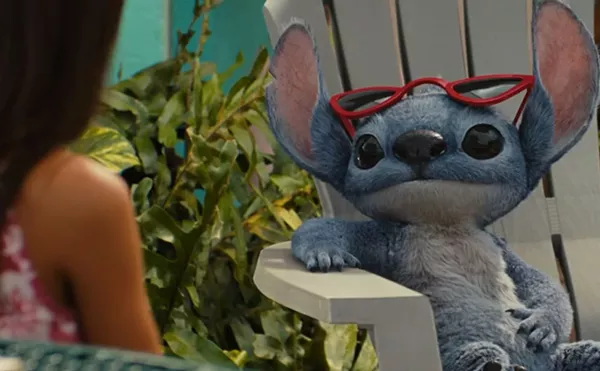
Audio By Carbonatix
[
{
"name": "GPT - Leaderboard - Inline - Content",
"component": "35519556",
"insertPoint": "5th",
"startingPoint": "3",
"requiredCountToDisplay": "3",
"maxInsertions": 100,
"adList": [
{
"adPreset": "LeaderboardInline"
}
]
}
]
Have you ever wondered if you were crazy? If so, James Mangold’s Girl, Interrupted might just get you harping on the question. His moving on-screen rendering of author Susanna Kaysen’s 1993 nuthouse memoir is an implosion – a shadowy swim through the mind and experiences of a young woman who spends a year in a Massachusetts mental institution because she is convinced she is crazy.
And as it turns out, believing you’re crazy may be just as serious and life- threatening as any "real" mental illness. In fact, this self-doubt can stop life entirely, as it does here. Girl, Interrupted is a moving picture, but a frozen moment as well, a drowning pause due to a loss of confidence in everything. Never short on self-indulgence, the movie makes indictments and evokes a guilty sympathy like some twisted version of One Flew Over the Cuckoo’s Nest for manic-depressive co-eds.
As Susanna (Winona Ryder) chain-smokes and questions her state of mind in a taxi on the way to the hospital, she speculates, "maybe it was just the ‘60s." And it was. But it was also the cocktail party haze her parents inhabited. It was also the self-doubt injected into her by one of those high-school counselors administering helpful doses of career direction and identity anxiety.
The funny thing is, from Susanna’s point of view, the outside world does look a lot more hellish than the dank, narrow ward that offers shelter to her and her fellow patients. She shares a ward with a pathological liar, a bulimic, a burn victim and, most notably, a Prozac-chic sociopath named Lisa (Angelina Jolie). The ward is overseen by a warm-hearted but tough black nurse, Valerie (Whoopi Goldberg), who wears a knowing grin, a big Afro and a crocheted poncho over her uniform.
Ryder plays Susanna perfectly as a young, introspective would-be writer who wears her vulnerability and mildly neurotic tendencies as flamboyantly as any outcast teen. Her dialogues and voice-overs come off with the grace and bent of confessional poetry – insightful yet self-obsessed. Her self-concept bleeds through her tailored, cropped good looks and cloddish elegance. It all gives her identity crisis a depth that you can almost jump into.
Unfortunately, Lisa is a more difficult character to embrace. Overly confident, dramatic, controlling and constantly smudged with copious amounts of muddy lipstick, this in-patient is a more likely candidate for a Calvin Klein ad than a mental ward. Her hip, tragic-bitch presence here is like throwing one of the cast members of Natural Born Killers into the silent rage of The Bell Jar. This unpleasant clash is constantly buzzing behind Mangold’s otherwise engrossing and telling version of Kaysen’s story.
Send comments to letters@metrotimes.com.





